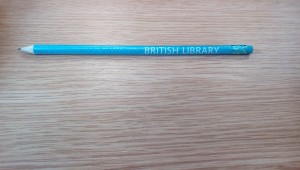Last November Simon Bralee charmed our readers with his review of History Day 2015. Like many librarians, it is his wont to wear many hats. In his review of that day he intrigued many with his depiction of how an information professional at the top of his game balances so many hats on his head. You asked for more such reviews and we organised it for you.
One Library, Two Sites
In February I was asked to attend the British Library doctorial open day for pre-1600 materials. This day was a great opportunity to find out more about the services offered and collections held at the British Library. I also hoped to find out how users approach such collections. This would help support my work in Academic Services and Archives group here at City. I am also interested in ancient documents, especially from Byzantine Egypt, and hoped to find out more about what the “BL” holds in regard to this.

The day began with an introduction by Claire Breay, Head of Ancient, Medieval and Early Modern Manuscripts. She introduced us to her collection, which covers of wide span of the Western Heritage Collections at the library.
The British Library has a very good collection of Ancient documents; highlights include The Constitution of Athens, the Codex Siniaiticus and Egerton Gospel. The library holds over 3000 ancient papyri and numerous books related to the Ancient World in various languages. Some of these items have been digitised, but not all. The majority of the around 900 Greek medieval manuscripts held by the library have been digitised and put online. This is thanks to the generosity of the Stavros Niarchos Foundation. Other collections have not been so fortunate to have found a donor. It was also interesting to note that different departments may be responsible for different collections. For example, a person working in Late Antique Egypt must needs go to three places for primary sources held by national collections in London. He would go to the Manuscripts Reading Room for Greek Papyri, the Asian and African collections to read the Coptic Collection and for Demotic documents he would go to the British Museum. If he would wished to consult secondary literature about this period he would need to resort to the Humanities Reading Room.

The British Library also holds several very important Medieval and Renaissance collections. As a medieval historian herself, Claire also encouraged us to explore medieval items kept by the library. She said that the medieval and early-modern charters and rolls held by the library were a real strength of the collection. She also mentioned that the library had a good collection of seals, as witnessed by this charming seal.
Stephen Parkin, Curator in Printed Heritage Collections, discussed early modern printed collections. This included incunabula and Renaissance collections held by the Library. The British Library holds over 40% of the surviving incunabula in the world. A scholar of Italian manuscripts, he reminded us that the British Library holds excellent collections in different languages. The Italian and Spanish collections for example are considered the best in the world outside of their “home” countries. Much of his talk centred on how to discover and use his collections.

The morning closed with a talk by Tom Harper, who is Maps curator. As a young man, he fell in love with maps whilst studying early-modern Ireland. The British Library holds the National Map Collection. Pre-1500 collections are patchy but after 1600 collections increase in number. This is mainly for historical reasons: the increase in land value and expanded world views but also corresponds to the increase in items after this date. The library’s maps can be found anywhere in the collection. The four main areas however would be manuscripts library, the early printed collection, Asia and Africa and the Map library.
After lunch the group split in two. Following a visit to a reading room, where a selection of manuscripts and early printed books were laid before us to poke about with, we were taken back to the Brontë Meeting Room. There to discuss the finding and correct use of manuscripts. I will discuss this in another post. It was however, an interesting talk.

Nora McGregor, Digital Curator, next before us came. She discussed how the British Library can help researchers by offering digital support in specific projects. She used examples such as the Big Data History of Music and Virtual Mappa Projects. It is worth looking at these examples to see what the team have done. Nora has also been involved in British Library Labs. This is an initiative that seeks to use the BL’s digital collections in innovative ways. They have also began organising a series of projects called British Library Labs Roadshows. One of which was to begin later that day at a certain world class university based in Finsbury.
The final talk of the day was by Jane Winters, Institute of Historical Research (IHR). She discussed the resources available to students based in London and outside of London. Postgraduate students based in London can take advantage of the Institute Library and the regular series of public seminars. The Institute website also hosts many valuable resources including databases and podcasts. The School of Advanced Study, University of London (of which IHR is a member) offer several online courses (in different disciplines). This includes palaeography classes which are very useful for students of pre 1600 resources.
Interesting day on pre 1600 materials @britishlibrary #blopenday
— Braleebatch (@Braleebatch) February 1, 2016
Overall the day was very informative and useful. Wearing many hats through the day was tiring but I was able to find out the different things I set out to discover. It was also very nice to meet with such friendly librarians and students and chat about library resources. If you get a chance I recommend going etc.